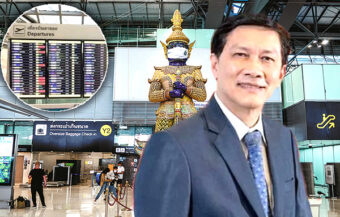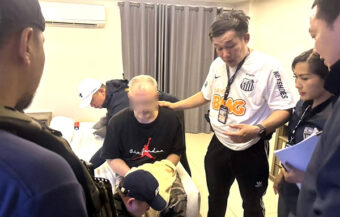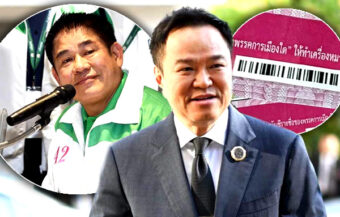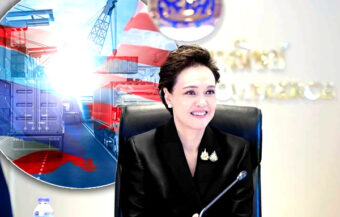Anutin Charnvirakul flipped from denying ambition to launching a high-stakes coalition bid, mobilising Bhumjaithai, courting key parties and counting on Pheu Thai defections as Thailand reels from political upheaval and a government in crisis.
A bold and calculated move on Friday by the Bhumjaithai Party and its leader, Anutin Charnvirakul, aims to make him Thailand’s 32nd Prime Minister. After Friday’s democracy-defining Constitutional Court judgment, closely watched by Thai audiences, Anutin moved immediately. PR campaigns and planted news reports hit the media hours before the decision confirmed the removal of Prime Minister Paetongtarn Shinawatra. The political angst, however, is just that. Anutin has played his hand and Thailand is now in a political crisis. In the coming days, parliament will hold a showdown that could determine the next prime minister.
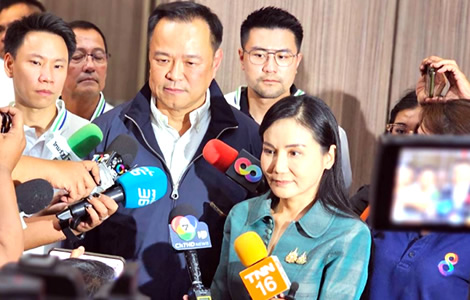
Anutin Charnvirakul reversed himself with dizzying speed. In the morning, he said he had no interest in power. However, by nightfall, he was orchestrating a high-stakes coalition push. His motorcade moved across Bangkok on Friday evening. Meetings were held. Numbers were counted. Leaks flowed fast. Although he had just denied ambition, his actions told a different story. The man who said no was clearly preparing for a yes.
The catalyst was the Constitutional Court’s ruling. Paetongtarn Shinawatra was disqualified for breaching Section 170, combined with Section 106. Basically, the PM was judged lacking in integrity due to the leaked Hun Sen phone call on June 15.
Anutin sprang into action. Within hours, his party had reactivated its machinery. This wasn’t a knee-jerk move—it looked premeditated. Even before the ruling, Bhumjaithai had quietly signalled discontent with the status quo. But now, they were ready to move.
Bhumjaithai signals leadership ambition by pushing caretaker consensus government with promises
Suddenly, talk of a “caretaker consensus government” filled the air. Although the phrase sounded neutral, the ambition behind it was clear. Bhumjaithai aimed to lead. The party floated promises: a short-term transitional cabinet, a binding referendum and a return to the polls within months. Many were sceptical, yet the pace of manoeuvring left no doubt—this was a real bid.
Crucially, Bhumjaithai accepted the People’s Party’s three core demands without resistance. Those demands—referendum, constitutional assembly and resignation within four months—had previously been dismissed by conservative blocs.
Now, Anutin embraced them wholesale. For some, it is a surprising shift. For others, it suggests pure opportunism. Either way, it marks a sharp turn in the political road.
However, even with growing momentum, victory is far from guaranteed. The People’s Party made clear they would not enter cabinet. Their support is conditional, and their trust in Anutin is limited. Indeed, it has certainly not yet been placed.
Legal barriers prevent their banned figures from holding office, yet they remain key power-brokers. While Bhumjaithai hopes for their votes, the People’s Party remains cagey, speaking only in terms of oversight, not endorsement.
Coalition support remains conditional as key parties withhold full commitment to Anutin’s bid for power
Moreover, negotiations with other parties are delicate. Anutin and senior lieutenants approached Kla Tham, seeking to lock in another bloc. They received a guarded response. There was no commitment, only a statement that discussions were “ongoing.” These words left the door open but offered no firm path forward. In coalition-building, soft signals aren’t the same as solid numbers.
At the same time, defections from Pheu Thai began to stir. Reports surfaced of northeastern MPs breaking ranks. Some blamed party leadership for taking them for granted.
However, these defections, while painful for Pheu Thai, don’t yet guarantee Bhumjaithai a clear majority. Despite loud whispers, the parliamentary math remains unstable. Nothing is locked in.
Anutin’s public stance has also changed. Where once he ruled out leadership, now he presents himself as a stabiliser. He claims to be stepping in only to prevent chaos.
Yet, many see through the spin. His party’s sudden coordination suggests long preparation, not reluctant duty. As ever in Thai politics, moves are made long before they’re seen.
Despite rapid moves, parliamentary math remains unstable, and Anutin’s Premiership is not assured
Nevertheless, uncertainty dominates. Yes, Bhumjaithai has made its play. Yes, support is being gathered. But no, the outcome isn’t certain.
Many actors remain on the fence. Resistance from inside Pheu Thai is hardening. The People’s Party may yet opt to support Pheu Thai if promises are made. However, former Premier Thaksin’s imprisonment court case is looming. Therefore, the political ground remains shaky for all concerned.
Although Anutin has emerged as a contender, he is not yet a winner. This is a hand played, not a hand won. The pieces are in motion, yet the endgame is far from clear. He may have moved first. That doesn’t mean he’ll finish first.
Beyond these initial moves, additional pressure is evident across Thailand’s political landscape. Reports suggest that the Bhumjaithai Party has counted over 280 potential votes, including their 69 MPs, 143 from the People’s Party, 25 from Kla Tham, 20 from Palang Pracharat and support from small parties and independents.
Significantly, whispers indicate that up to 15 Pheu Thai MPs might also defect. Even so, these numbers remained unconfirmed. Until every party formally commits, the coalition remains fragile.
Public attention and coalition pressure build as Bhumjaithai seeks to lock in uncertain support
Meanwhile, public attention intensifies. Journalists circulated minute-by-minute updates on Friday, analysts speculated and social media amplified every leak. At the same time, the Bhumjaithai Party appeared to be scrambling to lock in commitments.
Even minor delays could shift the balance in this game. As ever, in Thai politics, perception often equals power. Therefore, Bhumjaithai’s visible coordination was as much a signal as it was a strategic move.
Internal dynamics also mattered. Kla Tham Party’s leadership, while meeting Anutin, repeatedly stressed the need for internal discussion. At the same time, Thamanat Prompow reportedly left the final decision to the majority of party members.
These procedural pauses indicated that even close allies were not entirely aligned. Furthermore, Bhumjaithai’s broader coalition needed more clarity before any official declaration.
The People’s Party’s position remains pivotal. While it offers its conditional support, it will not enter the cabinet. Instead, it retained oversight authority, ensuring that any government aligned with its terms.
Additionally, the party emphasises that its agreement is not unconditional. Any breach of previously agreed-upon terms could trigger withdrawal of support. Consequently, Bhumjaithai’s assumption of these votes carries a significant risk.
Friday to Saturday tension grows with defections, internal deliberations and conditional party support
As Friday turned to Saturday, tension grew. Defections, internal deliberations and conditional endorsements created a dynamic and unpredictable environment. Indeed, Thailand’s broader political history heightened the stakes.
Within the past year, two prime ministers had been removed by the Constitutional Court due to relatively minor acts or day-to-day decisions. Hence, political stability was already fragile. Any misstep could provoke further turmoil. This environment, of course, stymies decisive actors in government. Something Thailand certainly needs.
Even with momentum, the Bhumjaithai Party faces logistical and strategic challenges. Forming a government designed to resign within four months presents both practical and political risks. Meanwhile, the defections from Pheu Thai were not yet openly visible or confirmed.
At the same time, coordination with smaller parties requires constant negotiation. On Friday evening, even after a visit by Mr. Anutin, Acting Minister of Education Narumon Pinyosinwat and Kla Tham Party leader was notably non-committal.
Managing public perception and elite expectations remain critical components of Anutin’s political strategy
In addition, ensuring public confidence while managing elite expectations demands careful messaging. As ever, timing and perception are critical. For instance, the Bhumjaithai Party leader has support among cohorts of the Bangkok media that lean to the right.
Ultimately, Anutin’s bid illustrates both opportunity and uncertainty. Although he has moved decisively, the proposed coalition remains largely unconfirmed. Meanwhile, opposition within the People’s Party, particularly among backbench MPs to Anutin as Prime Minister, is growing.
The People’s Party is traditionally aligned with the Pheu Thai Party. Opinion polls have consistently shown this. For example, in recent polls, Pheu Thai Party support has drifted to the People’s Party. The Bhumjaithai Party is seen as a conservative, nationalist and right-wing Thai political party.
Furthermore, the public remains wary after repeated political upheavals. Therefore, even a carefully orchestrated move carries inherent risk.
This is a political party with a very low level of popular support. For instance, it only managed 3% in the 2023 General Election in the party list vote. Notably, in consistent polls right up to recently, 65% of the public support a Pheu Thai–People’s Party alliance.
Political pressure and constitutional instability continue to shape Thailand’s uncertain leadership transition
Of course, the Pheu Thai Party brand is now perceived as damaged. However, on the other hand, international opinion is sceptical of a constitutional order that has seen two Prime Ministers removed from power within one year. Certainly, in any Western democracy, political leaders are allowed a lot more freedom and flexibility.
The 2017 Constitution and its associated agencies and mechanisms place an onerous burden on politicians. It is a minefield, but of course, it is the law and must therefore be respected.
However, its overhaul is now unquestionably an imperative for the future stability and economic well-being of Thailand.
PM Paetongtarn Shinawatra ousted by Constitutional Court, collapsing Thai government over audio clip
Undeniably, Bhumjaithai’s rapid mobilisation highlights the fluidity of Thailand’s political environment.
While Anutin has positioned himself at the centre of the latest power play, success is by no means assured. At the same time, vocal opposition backbench MPs, procedural challenges and the Bhumjaithai Party’s lack of commitment previously to constitutional reform now emerge as players in an evolving political battlefield.
Ultimately, the coming weeks will reveal whether this hand played by Anutin results in lasting influence or temporary momentum. In short, this may be a flash in the pan or a last-ditch grasp at power by conservative forces desperate to avoid the change represented by the People’s Party.
Join the Thai News forum, follow Thai Examiner on Facebook here
Receive all our stories as they come out on Telegram here
Follow Thai Examiner here
Further reading:
PM Paetongtarn Shinawatra ousted by Constitutional Court, collapsing Thai government over audio clip
Prime Minister Paetongtarn Shinawatra a no-show at cabinet and an appointment with Pheu Thai MPs




